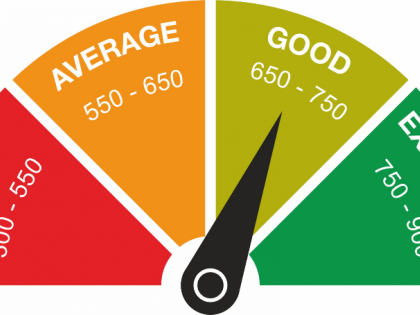10 Factors that Affect Your CIBIL Score
By Impact Desk | Updated: June 13, 2024 19:25 IST2024-06-13T19:21:49+5:302024-06-13T19:25:15+5:30
When you apply for a loan, your lender will request your credit score provided by leading credit bureaus like ...

10 Factors that Affect Your CIBIL Score
When you apply for a loan, your lender will request your credit score provided by leading credit bureaus like CIBIL. If your credit or CIBIL score is poor, your probability of securing a loan is lower. One advantage of having a good credit score is that you can get better offers on credit cards and loans with lower interest rates. A good score indicates that you utilise credit wisely and are less likely to skip payments. Let’s understand various factors that affect your CIBIL score.
What is a CIBIL score, and who manages it?
TransUnion CIBIL Limited, formerly known as Credit Information Bureau (India) Limited (CIBIL), maintains credit scores of borrowers in India. A CIBIL score is a three-digit number representing a person's credit history, rating, and report. It ranges between 300 and 900. A higher score signifies responsible credit utilisation.
Usually, a minimum CIBIL score of 750 is required for a credit card or a Personal Loan from leading providers like Kotak811. Depending on the applicant’s relationship with the financial institutions, most banks consider applications with credit scores of 650 or lower for loans and credit cards. However, they may charge a higher interest rate.
WhataffectsyourCIBILscore?
You can check your CIBIL score for free online and take necessary actions to maintain a healthy score. Here are the factors that affect your CIBIL score:
Negativepaymenthistory
Payment history is a major factor that influences your credit score. It shows how you have paid your dues over time, including how late you pay, and how many payments you have missed. Payment history includes information on credit cards, retail accounts, loan EMIs, mortgages, etc. A higher proportion of on-time payments can help you score higher. However, even a few missed payments can negatively impact your score.
Ahighcreditutilisationratio
A high credit utilisation ratio can lower your CIBIL score. The credit utilisation ratio is the percentage of credit you use, calculated by dividing your total debts by your total available credit. A high ratio indicates that you are using a large portion of your available credit, which could mean you are overspending or having trouble managing your finances.
You must keep your credit utilisation ratio below 30% to maintain a healthy credit score. To do this, keep low balances on your credit cards and pay off your balances each month.
Creditmix
Credit mix is the variety of credit accounts on a credit report, including secured loans like Home Loans and unsecured loans like Personal Loans, in addition to credit cards. It's a key factor in a credit report and accounts for 10% of a CIBIL score. A good credit mix includes secured and unsecured loans, revolving credit, and instalment credit.
Credithistory
A longer credit history can indicate stability and experience in managing credit, and it can contribute to a higher credit score. Credit history is one of several factors that affect a credit score. A longer credit history provides more data points for evaluation, which is worth about 10% of a credit score's calculation.
Multipleinquiries
Multiple "hard" credit inquiries can negatively affect your CIBIL score. A hard inquiry is registered on your credit report when a lender evaluates your loan application. Multiple hard inquiries in a short period can make lenders concerned that you are actively seeking credit, which can be seen as a risk.
Repaymenthistory
A person's repayment history is a significant factor in their CIBIL score, contributing to 35% of it. It is a record of all past and present payments to lenders, including on-time, late, and missed payments. Making timely payments can significantly improve a person's credit score, while late payments or defaulting on EMIs can negatively impact it.
Debt-to-Income (DTI) ratio
A DTI ratio is the percentage of your gross monthly income that goes toward debt repayment. A low DTI ratio can show your creditworthiness and improve your chances of getting a loan approved quickly. Ideally, your DTI ratio should be less than 40%.
Must Read: Minimum CIBIL Score Required For Credit Card
ErrorsinCIBILscore
Errors in a CIBIL report can lead to a low CIBIL score, which can impact your ability to apply for loans. To avoid any dip in your CIBIL score, you should check your CIBIL report regularly for errors and resolve them as soon as possible. You can immediately report any error you find on your CIBIL report to the bureau, asking for a correction. It is recommended to check your CIBIL score for free regularly, preferably every three months, for any errors.
Discontinuingoldcreditcards
Closing an older credit card account can negatively impact your CIBIL score. A longer credit history is generally considered more favourable, and closing an older card removes its associated credit history. It can also reduce the diversity of your credit accounts, which is another factor in CIBIL scoring. Before closing any credit accounts, you should consider these factors and manage your credit responsibly to maintain a healthy credit score.
Outstandingdebt
Outstanding debt can lower your CIBIL score, as about 30% of your score is based on the amount of debt you owe at the time. Outstanding debt includes the total principal and interest amount of a debt that has not yet been paid. This includes purchases, cash advances, balance transfers, interest, and additional fees you owe on your credit card.
Conclusion
One of the most essential aspects influencing your credit score is the timely payment of credit card bills, loan EMIs, and other debts. You can improve your CIBIL Score by setting up automated payments or reminders. Ensure you avoid making the mistakes mentioned in this article to maintain a higher CIBIL score and avail great benefits across various financial verticals.
Open in app